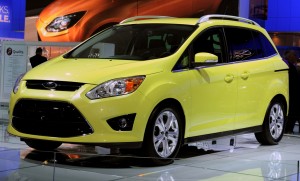
Battery-powered vehicles, like the new Ford C-Max, won't easily overtake the gasoline-powered automobile, cautions a new study.
“The reports of my demise have been greatly exaggerated,” Mark Twain reportedly once said, and the same appears to hold true for the internal combustion, it appears.
A new study suggests that gasoline power is likely to have more staying power than many might have anticipated due to a stream of technological advances reducing emissions and increasing fuel efficiency. And that is likely to mean much lower acceptance for alternative powertrain technologies, such as plug-in hybrids and battery-electric vehicles, or BEVs, cautions the Boston Consulting Group.
Demand for electrified vehicles will likely grow in China and Europe faster than in the U.S., reflecting strong government support for advanced technologies, the BCG report indicates.
“Electric cars will undoubtedly play an increasingly large role in many countries’ plans as energy independence and environmental concerns intensify,” said Xavier Mosquet, global leader of the consulting firm’s automotive practice. “But they will gain only modest ground up to 2020.”
That’s bad news, if true, for makers like Ford, General Motors, Nissan and Toyota, which have all committed to the rapid expansion of their battery-based vehicle line-up. Ford, for example, plans to have five plug-ins and BEVs in U.S. dealer showrooms by the end of next-year. The maker last week announced plans to turn its planned C-Max microvan into a battery-only line, with both a plug-in and a conventional hybrid in the works.
The new BCG study, titled “Powering Autos to 2020: the Era of the Electric Car?” echoes other recent reports, including one from J.D. Power and Associates which projected that all forms of battery-based vehicles – including more conventional hybrids – will only capture a 7% share of the U.S. market by 2020.
But the Boston Consulting Group study also appears at odds with other recent research that suggested consumers will pay a huge premium, whatever form of power they rely on, in order to meet strict new fuel economy mandates – 35.5 mpg by 2016 and possibly as much as 62 mpg by 2025.
The BCG study projected that by 2020, automakers could achieve significant improvements in mileage and a 40% reduction in emissions for just $2,000 per vehicle, on average. By comparison, another new study from the Ann Arbor, MI-based Center for Automotive Research, put the price tag at anywhere from $3,700 to $9,000. The higher numbers might actually work in favor of battery power by making electric propulsion more competitive.
If anything, said a CAR press release, significant price hikes could lead potential buyers to “shun” new products, “by holding onto their used vehicles longer.”
But BCG’s study contends that improving the internal combustion engine will be “cheaper than expected,” according to Mosquet, and a lot less than the typical $10,000 premium the consultant projected for a comparable battery-based vehicle.
There is a history of advanced technologies dropping steadily in cost as new features, such as catalytic converters, go into widespread production. The same thing could happen, BCG projects, with even more advanced systems, such as Direct Injection, turbocharging and more advanced 8-speed gearboxes.
How willing consumers are to accept alternative propulsion will depend on a variety of factors, including federal subsidies. The U.S. currently offers up to $7,500 for qualifying models, such as the Nissan Leaf or Chevrolet Volt – though the subsidies are limited in terms of the number of vehicles they will cover in a given year.
Significant subsidies are also being offered in other parts of the world, and when you add growing government pressure for the industry to convert to alternative propulsion, said BCG, demand is likely to grow faster in Europe and China, in particular.
Overall, the new study predicts that electrified vehicles should account for about 15% of total sales in North America, Europe, Japan and China by 2020.
